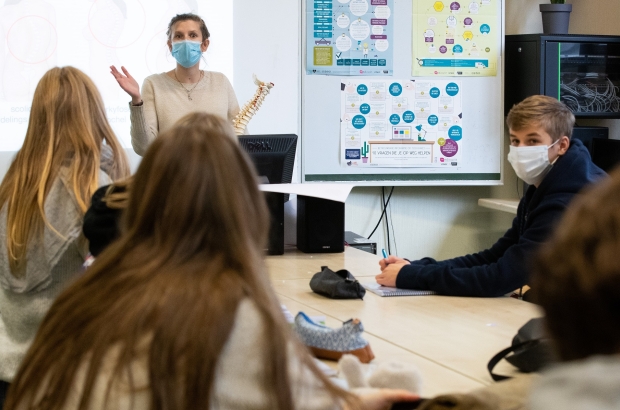- Daily & Weekly newsletters
- Buy & download The Bulletin
- Comment on our articles
Coronavirus in Belgium: The latest developments
What's the latest?
The delta variant of coronavirus has practically disappeared in Belgium, according to virologist Marc Van Ranst. Today about 90% of infections are the BA.2 version of the omicron variant. The BA.1 version of the same variant accounts for the other 10%. "I'm glad that delta has gone," said Van Ranst. "It reduces the risk of people getting seriously ill."
Many of Wallonia's vaccination centres will close from next month, with just nine vaccination hubs remaining open. The decision to rationalise the vaccination effort comes as a major campaign to ensure everyone receives their booster dose finishes. The nine remaining centres will be open without the need for an appointment. Details can be found at www.jemevaccine.be
Temporary unemployment linked to coronavirus fell in February, according to analysis of payroll data for 70,000 employees by the human resources service provider SD Worx. The number of people taking time off due to quarantine or having to care for a relative with the virus fell by 20% in February. In December and January, the figures had climbed by almost 50%. "The peak of corona temporary unemployment seems to have passed," SD Worx noted. "Manual workers are more affected than office workers, who have more easy access to remote working and can therefore continue to work despite a possible quarantine or contamination without possible symptoms."
Belgium is seeing a resurgence in cases of flu as the relaxation of coronavirus rules such as mask-wearing provide an "open door" for other non-Covid illnesses to spread. Seasonal diseases are making a strong comeback as people are no longer limiting their social contacts, and wearing a mask is no longer required in many places. Confirmed flu cases doubled last week. Doctors hope milder weather in the coming weeks will reverse that trend.
"Everything is moving upwards" in terms of Belgium's coronavirus figures, interfederal spokesman Yves Van Laethem has warned. He expects this to continue for some time, without having too significant an impact on the healthcare system and intensive care occupancy.
From this Thursday (17 March), anyone in Belgium who is confirmed to have had a "high-risk contact" with someone who has tested positive for coronavirus is no longer required to take a test themselves, or quarantine. These precautionary measures are not recommended any more - except for vulnerable people.
The next coronavirus consultative committee meeting has been postponed. It was due to be held on 25 March. It will now be moved to after the Easter holidays, to get a better perspective on how Belgium's coronavirus trends are evolving. It's a busy week in the Brussels events agenda next week anyway, with both Nato and EU summits.
Brussels' Common Community Commission (Cocom) is planning to rationalise its testing and tracing strategy, faced with a sharp decline in the number of tests carried out in the region. The first step will see the Molenbeek testing and vaccination centres merge, at Chaussée de Gand 696. Other mergers and/or closures of testing centres are expected to follow. The Brussels Covid call centre will also no longer carry out contact tracing when someone tests positive for the virus.
The recent increase in coronavirus infection numbers "is not a surprise", according to interfederal spokesman Yves Van Laethem. The reopening of nightclubs, carnival season and the half-term ski holidays are all contributing factors - but Van Laethem said this did not mean a tightening of the rules was again necessary. "There is nothing to worry about, but it is about remaining cautious and keeping a close eye on the situation," he added.
Brussels public transport operator Stib has clarified its rules on masks. You must wear one while travelling on a metro, tram or bus. In stations (underground) they are recommended, but not compulsory. Wearing a mask is no longer necessary at bus and tram stops outdoors (elsewhere, masks have not been required outdoors in Brussels since October 2020).
Seven people have been arrested in Brussels and Hainaut province as part of an investigation into a criminal gang suspected of making and selling fake Covid Safe Tickets. The CSTs were reportedly sold using the social network SnapChat. During a police raid, officers found a mobile phone storing 88 tickets under different names.
From 17 March, people who are not fully vaccinated will no longer be required to quarantine and take a test when they have a "high-risk" contact with someone who tests positive for coronavirus. This was already the case for the fully vaccinated. If you have been in contact with someone who has tested positive, you must still limit your contacts, wear a mask wherever possible and take a daily self-test.
Since November 2020, one billion coronavirus vaccines have passed through Brussels Airport - of which 75% were leaving the country and 25% entering. Vaccine flights have taken off every day to more than 60 countries, with Japan and the US the most common destinations.
As part of Belgium's gradual exit from coronavirus restrictions, the GEMS expert panel which advises the government on Covid strategy is expected to be disbanded on 8 April. At the same time, the role of coronavirus commissioner, currently occupied by Pedro Facon, will be phased out. Handling of the coronavirus crisis will remain the job of the federal public health ministry and the federal crisis centre, which between them have created 233 new full-time equivalent posts.
Latest trends - Saturday 26 March
Over the past seven days
- Average daily infections: 10,561 (+17%)
- Total infections: 3,782,085
- Test positivity rate: 30.0% (+3.2%)
- Infection rate: 1.11 (-1%)
- Booster doses administred: 7,090,854
- Average daily deaths: 19.9 (-1%)
- Total deaths: 30,686
- Average daily hospital admissions: 192.0 (+13%)
- In hospital: 2,680 (+18%)
- In intensive care: 165 (-4%)

















